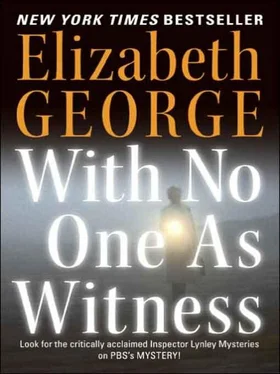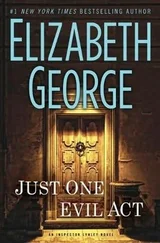Griff Strong, on the other hand, understood that only too well. He would do what it took to preserve his position in the organisation, and if that meant making ostensibly reluctant allegations of sexual harassment from a female superior who couldn’t keep her hands off his delectable albeit married and oh-so-hesitant body, then that was what he would do. So what Neil Greenham planted in the minds of the board of trustees and what Jack Veness watered, Griff would cultivate. He’d wear that blasted fisherman’s sweater for the interview, as well. If he told himself anything, he would list the reasons why they’d come to a situation of every man for himself. Arabella and Tatiana would top that list. “Rike, you know I’ve got personal responsibilities. You always knew that.”
The only person Ulrike could come up with who might speak up in support of her was Robbie Kilfoyle, and that was merely because as a volunteer and not a paid employee, he’d have to be careful when interviewed. He’d have to walk a fine line of neutrality because he’d have no other way to protect his future and move himself along in the direction he wanted, which was paid employment. He couldn’t want to deliver sandwiches for the rest of his life, could he? But he had to be positioned, had Rob. He had to see himself as a player on her team and no one else’s.
She went in search of him. It was late in the day. She didn’t check the time, but the darkness outside and the emptiness of the building told her it was long after six and probably closer to eight. Robbie often worked later into the evenings, putting things back in order. There was a good chance he was still in the back somewhere, but if he wasn’t, she was determined to track him down.
He was nowhere in the building, however. The kit room was compulsively neat-something to compliment Rob on when she saw him, Ulrike thought-and surgery could have been performed in the practice kitchen so tidy was it. The computer lab had been seen to as well, as had the assessment meeting room. Rob’s careful marks were evident everywhere.
Rational thought told Ulrike to wait till the next afternoon to speak to Robbie. He would turn up round half past two as always, and she could thank him and forge a bond with him then. But anxiety suggested she start forging straightaway, so she looked up Rob’s phone number and rang his house. If he wasn’t there, she reckoned, she could leave a message with his dad.
But the double ringing went on and on. Ulrike listened to it for a good two minutes before she rang off and went on to plan B.
She was, of course, flying by the seat of her jeans, and she knew it. But the part of her that was saying, Relax, go home, have a bath, drink some wine, you can do all this tomorrow was outshouted by the part of her exclaiming that time was flying and the machinations of her enemies were well under way. Besides, her stomach had been riding above her lungs, it seemed, for most of the day. She was never going to be able to breathe, eat, or sleep with ease till she did something to alter that.
And anyway, she was a doer , wasn’t she? She’d never sat round and waited to see how events unfolded.
In this instance, that meant corralling Rob Kilfoyle so he’d be ready to take her part. The only way she could see to do that was to get on her bicycle and find him.
It took the A to Z to accomplish the first part of the plan, since she had no clue where Granville Square was once she had Rob’s address in hand. She found it tucked to the east of King’s Cross Road. This was a definite plus. She would merely have to work her way up to Blackfriars Bridge, cross the river, and head north. It was simple, and its simplicity told her the journey to Granville Square was meant to be.
She saw it was later than she’d thought once she was outside and aboard her bicycle. The commuter traffic had long since thinned out, so the trip up Farringdon Street-even in the vicinity of Ludgate Circus-wasn’t as white knuckling as she’d expected.
She made good time to Granville Square, a four-sided terrace of simple Georgian town houses in various states of disrepair and renovation, typical of so many neighbourhoods in London. In the centre of the square was the ubiquitous patch of nature, this one not locked off, barred, and otherwise kept private to all but paying residents of the nearby houses, but rather open to anyone who wanted to walk, read, play with a dog, or watch children romp in the miniature playground along one side. Rob Kilfoyle’s house faced the middle of this playground. It was dark as a tomb, but Ulrike parked her bike by the railing and went up the steps anyway. He could be in the back, and now that she’d come, she wasn’t about to leave without making an attempt to roust him out of there if he was within.
She knocked but gained no reply. She rang the bell. She tried to peer in the front windows, but she had to resign herself to the admission that other than affording her exercise, the ride across town to this borderland between St. Pancras and Islington had been wasted.
“He isn’t home, our Rob,” a female voice declared behind her. “No surprise in that, though, poor lad.”
Ulrike turned from the door. A woman was watching her from the pavement. She was shaped like a barrel, with a similarly shaped, wheezing English bulldog on a lead. Ulrike went back down the steps to join her.
“D’you happen to know where he is?” She introduced herself as Rob’s employer.
“You that sandwich woman?” The woman said she was, “Sylvia Puccini. Missus. No relation by the way, if you’re musical. Live three doors down. Known our Rob since he was a toddler.”
“I’m Robbie’s other employer,” Ulrike said. “At Colossus.”
“Didn’t know he had another employer,” Mrs. Puccini said, eyeing her carefully. “Where’d you say?”
“Colossus. We’re an outreach programme for youth at risk. Robbie’s not strictly an employee, I suppose. He volunteers in the afternoons. After he does his sandwich round. But we consider him one of us all the same.”
“Never mentioned it to me.”
“You’re close to him?”
“Why d’you ask?”
Mrs. Puccini sounded suspicious, and Ulrike could sense that they might easily head into Mary Alice Atkins-Ward territory if she pursued this route. She smiled and said, “No particular reason. I thought you might be since you’ve known him so long. Like a second mum or something.”
“Hmm. Yes. Poor Charlene. God rest her dear tormented soul. Alzheimer’s, but Rob would have told you that, I expect. She went off early winter last year, poor thing. Didn’t know her own son from shoe leather at the end. Didn’t know anyone , if it comes down to it. And then his dad. He hasn’t had an easy time of it for the last few years, our Rob.”
Ulrike frowned. “His dad?”
“Dropped like a stone. Last September, this was. Setting off to work like always and drops like a hundredweight. Falls straight down the Gwynne Place Steps right over there.” She indicated the southwest end of the square. “Dead before he ever hit the ground.”
“Dead?” Ulrike asked. “I didn’t know Rob’s dad was also…He’s dead? You’re sure?”
In the light of a streetlamp, Mrs. Puccini cast her a look that indicated how bizarre she thought the question was. “If he’s not, luv, we all stood round and watched someone else get sent off to be cremated. And that’s not very likely, is it?”
No, Ulrike had to agree, it certainly wasn’t. She said, “I suppose it’s just that…You see, Rob’s never mentioned his dad passing away.” On the very much contrary, she added to herself.
“Well, he wouldn’t, I expect. I can’t say Rob’d ever be the sort to go shopping for pity, no matter how bad he felt about his dad’s passing. Vic was one who didn’t ever tolerate whingers, and you know what they say: as the sapling’s bent. But make no mistake about it, my dear. That boy felt deeply when he found himself alone.”
Читать дальше












